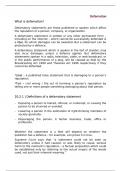Defamation
What is defamation?
Defamatory statements are those published or spoken which affect
the reputation of a person, company, or organisation.
A defamatory statement in written or any other permanent form –
including on the internet – which cannot be successfully defended is
a libel,
libel for which damages can be awarded. But a statement can be
protected by a defence.
A defamatory statement which is spoken in the tort of slander, may
also incur damages, unless a defence applies. But defamatory
statements spoken in a radio, television, cable, or web broadcast, or
in the public performance of a play, will be classed as libel by the
Broadcasting Act 1990 and Theatres Act 1996 respectively if they
cannot be defended.
*Libel – a published false statement that is damaging to a person’s
reputation.
*Tort - civil wrong / the act of harming a person’s reputation by
telling one or more people something damaging about that person.
20.2.1 | Definitions of a defamatory statement
- Exposing a person to hatred, ridicule, or contempt, or causing the
person to be shunned or avoided.
- Lowering a person in the estimation of right-thinking members of
society generally-
- Disparaging the person, it he/her business, trade, office or
profession.
Whether the statement is a libel will depend on whether the
publisher has a defence – for example, can prove it is true.
Supreme Court says that “a statement could not be seen as
defamatory unless it had caused, or was likely to cause, serious
harm to the claimant’s reputation – a factual proposition which could
be established only by referring to the actual impact of the words
used, not just their inherent meaning.”
, 20.2.2 | Meaning of words
In defamation law, a statement is held to have just one meaning –
which will not necessarily be the meaning intended by the author or
publisher.
The words must be read in full and in their context, because a
statement is which is innocuous when standing alone can acquire
defamatory meaning when juxtaposed with other material.
Those editing footage must take care how pictures interact with
each other and with any commentary – what meanings are being
created?
20.2.3 | Inferences
An inference is a statement with a secondary meaning which can be
understood by someone without special knowledge who “reads
between the lines in the light of his general knowledge and
experience of worldly affairs.”
In many cases, identification is not in question. However, the
statement can refer to the claimant even if they are not expressly
identified:
- Dropping hints - not naming the person doesn’t mean that you
haven’t identified them.
- Pixelated Pictures - it may still be possible to identify the
person shown.
- Not defaming groups, but defaming members of that group.
- Writing a true story about someone but identifying the wrong
person.
20.2.4 | Innuendoes
An innuendo in the law of defamation is a statement which seems to
be innocuous to some people but is defamatory to people with





